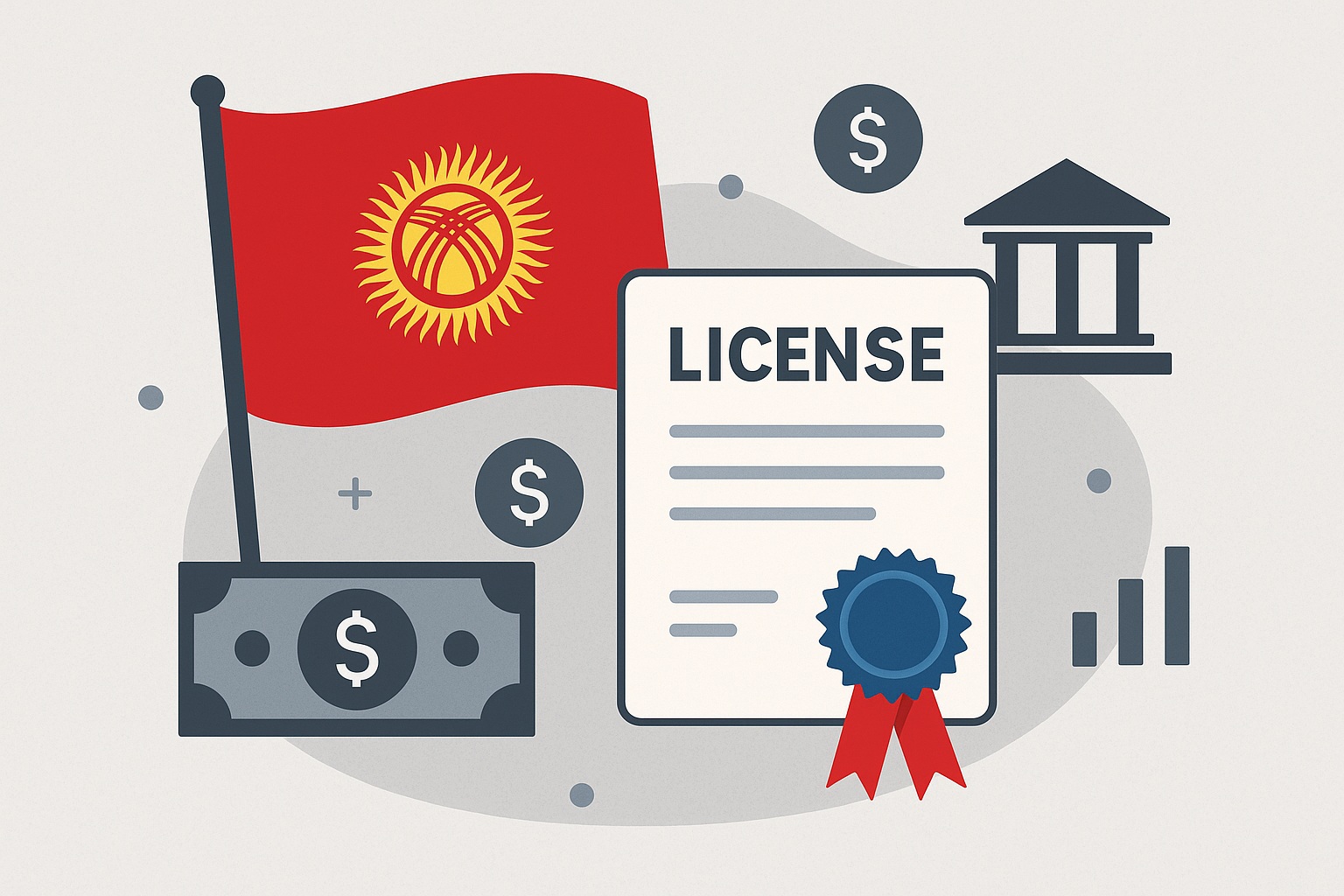Kyrgyzstan, as a member of the Eurasian Economic Union (EAEU), is actively developing its financial sector, attracting investments and promoting the digitalization of services. Financial activities here are strictly regulated to ensure stability, consumer protection, and the prevention of money laundering. The main licenses are issued by the National Bank of the Kyrgyz Republic (NBKR) for banks and payment systems, while the State Service for Regulation and Supervision of the Financial Market (FinSupervision) under the Ministry of Economy and Commerce is responsible for non-bank financial institutions, including microfinance companies, insurance, and audit services.
In this article, we will examine the key financial licenses, the process of obtaining them, and the current trends in 2025. The information is based on the Law “On the Licensing and Permitting System” and the normative acts of the NBKR.
Regulatory Authorities and General Principles
FinSupervision oversees the non-bank sector, including audit, insurance, and microfinance, as well as the implementation of financial reporting and auditing policies. The NBKR, in turn, licenses banks, payment organizations, and payment system operators, ensuring compliance with requirements for capital, risk management, and AML (anti-money laundering).
Licenses are issued for an unlimited period but require annual confirmation of compliance, including financial stability and the presence of qualified personnel.
According to Article 15 of the Law on the Licensing and Permitting System, financial licenses are mandatory for operations involving payment acceptance, lending, investments, and financial information processing.
In 2025, the focus is on digitalization: simplified procedures have been introduced for fintech companies, but with strict capital requirements (a minimum of 40 million KGS for crypto-licenses). Foreign investors from EAEU countries also undergo due diligence checks. Thanks to preferential tax regimes, a licensed company can benefit from one of the lowest tax rates in the post-Soviet space.
Main Types of Financial Licenses
Kyrgyzstan distinguishes several categories of licenses depending on the type of activity. The key ones include:
- Banking License
Issued by the NBKR for deposit-taking, lending, and settlement operations. Requires a minimum charter capital of 200 million KGS (approx. USD 2.3 million). In 2022, three major microfinance companies (Bai-Tushum, FINCA, Kompanion) converted their licenses into full banking licenses, showing sector growth. These licenses allow operations in both national and foreign currency, including under Islamic finance principles (special Sharia-compliant license). - Payment Services and Systems License
For payment system operators (processing, clearing, etc.), regulated by the “Regulation on Licensing Payment Organizations” (NBKR Resolution No. 2017-П-12). Covers acceptance of third-party payments, transfers via electronic systems. Minimum capital requirement: 50 million KGS. In 2025, this is popular among fintech companies focusing on mobile payments and EAEU integration. - Microfinance License
Issued by FinSupervision for credit unions, pawnshops, and microfinance organizations (MFOs). Currently, about 130 MFOs and 84 credit unions operate in the country. Requirements: minimum capital of 5 million KGS and qualified staff. In 2025, the emphasis is on financial literacy — banks like FINCA run client education programs. - Audit and Financial Reporting License
Required for auditing firms under the Law “On Auditing Activities.” Requires certification, 3–7 years of experience, and passing an exam. FinSupervision maintains the register and conducts quality inspections. Mandatory for all financial institutions. - Crypto License / Virtual Assets License
Legalized since 2022; issued by the NBKR to exchanges and providers. Minimum capital — 40 million KGS, mandatory AML procedures. Kyrgyzstan positions itself as a crypto hub, with licenses issued indefinitely. - Insurance and Brokerage Licenses
For insurance and securities brokerage. Issued by FinSupervision; require registration in the official register and a financial guarantee. Includes processing financial information on behalf of third parties.
Additionally, separate permits are required for currency exchange operations (467 exchange offices as of 2022) and lotteries/gambling (legalized since 2021).
The Licensing Process
Obtaining a financial license is a multi-stage process regulated by the NBKR or FinSupervision. The average timeframe is 30–60 days, but for banks it can take up to 6 months due to thorough checks.
- Document preparation: Application, charter, business plan, proof of capital, information on beneficiaries, AML policies. For foreign applicants — documents must be apostilled (e.g., Chinese certificates with apostille).
- Submission and review: Directly or via power of attorney. Authorities check compliance (financial stability, absence of sanctions). State fee: from 10,000 KGS.
- Inspection and decision: Office inspection and management interviews. Refusal is possible in case of non-compliance (Article 21 of the Law). The license is issued indefinitely, subject to annual compliance checks.
- For non-residents: Company registration in Kyrgyzstan takes 3 days in person or 15 days for remote registration of an LLC (OsOO). After registration, one may apply for a license.
Financial Licenses: Requirements and Business Risks
Key requirements:
- Minimum capital thresholds.
- Qualified staff (at least 50% Kyrgyz citizens in some sectors).
- Implementation of AML systems.
Risks:
- Revocation of license for violations (fines up to 1 million KGS).
- Sanctions for unauthorized activity.
- In 2025, stricter oversight of crypto and payments due to FATF recommendations.
Foreign companies applying remotely must submit apostilled documents.
Trends in 2025
In 2025, Kyrgyzstan focuses on fintech and green finance: tax benefits introduced for IT parks (0% profit tax). The sector is expanding — 21 banks and about 130 MFOs are operating. For foreigners, the market is attractive due to low tax rates (including a simplified unified tax regime) and access to clients both from the EAEU and international markets (USA, EU).
Conclusion
Kyrgyzstan offers one of the most open and potentially profitable licensing regimes in the region. Banking, payment, and crypto licenses are particularly appealing to foreign investors thanks to relatively low entry barriers compared to neighboring countries and preferential tax regimes.
Our company assists at every stage of obtaining a license in Kyrgyzstan — from remote company registration with accounting support and licensing, to facilitating the purchase of ready-made companies.
